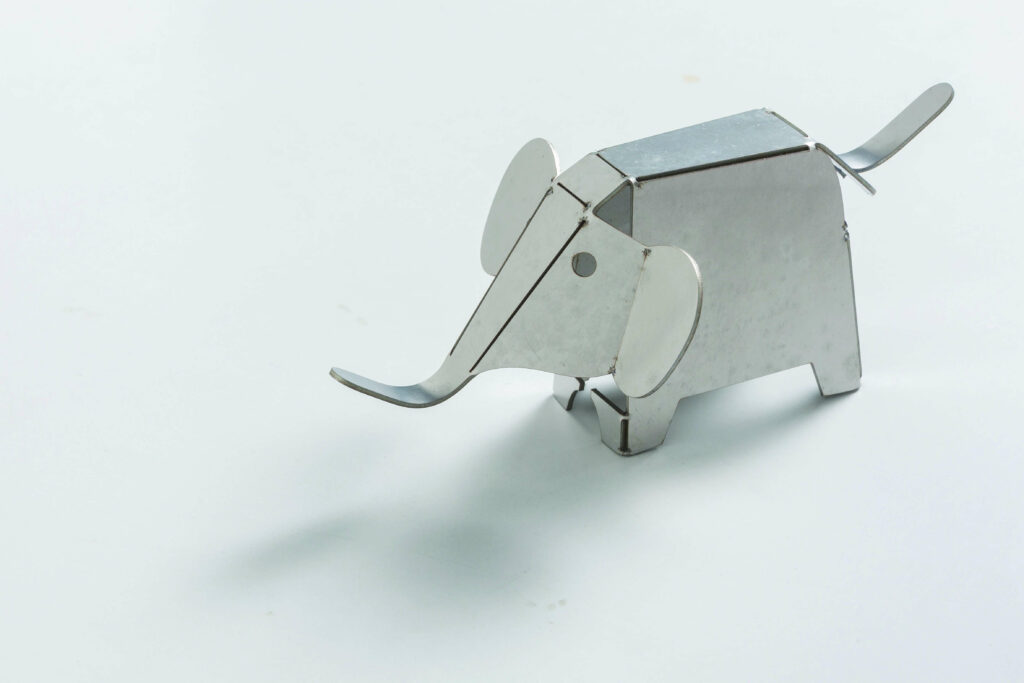目錄大綱
- 1 Laser cutting machine uses and technologies
- 2 Comparison table of (features) between metal laser engraving machines and metal laser cutting machines
- 3 Comparison table of metal laser engraving machines and metal laser cutting machines (applications)
- 4 Comparison table of (advantages) between metal laser engraving machines and metal laser cutting machines
- 5 Comparison table of (disadvantages) between metal laser engraving machines and metal laser cutting machines
- 6 Summarize
- 7
You may be wondering what metal laser engraving is and how it is used in manufacturing. Simply put, metal laser engraving is a process that uses lasers to create designs or information on a piece of metal. It is usually used on products that need to be decorated or engraved with trademarks, text or other designs.
Metal laser engraving can be used on a variety of metals, including aluminum, brass, copper, gold, silver and titanium. It is a popular choice for products that require a high degree of detail, such as jewelry, watches, and medical implants. In this article, we’ll take a closer look at the metal laser engraving process and how it’s used in manufacturing.
A laser cutter is a highly sophisticated industrial device that uses a laser beam to cut, engrave and punch holes in a variety of materials. The technology is widely used in manufacturing, construction, medical and other fields and is valued for its efficiency, precision and versatility.
Laser cutting machine uses and technologies
The basic working principle of the laser cutting machine is to use the high energy density of the laser beam to heat the material to a temperature where it instantly melts or vaporizes, and then uses nitrogen, oxygen or other auxiliary gases to blow away the melted or vaporized part of the material, thereby achieving cutting or Engraving purpose. Key advantages of this technology include:
- Precision and Complexity: Laser cutting machines are capable of highly precise cutting and engraving, maintaining consistent quality even on complex geometries.
- Contactless processing: The laser beam does not require actual contact with the workpiece, so physical damage can be avoided, especially suitable for processing fragile materials.
- Multi-material processing: The laser cutting machine is suitable for a variety of materials, including metal, plastic, wood, glass, ceramics, etc., expanding its application fields.
- Fast processing speed: The high energy density of the laser beam means that the material can be heated quickly, so laser cutting machines usually have efficient cutting speeds.
- Flexibility: Laser cutting machines can be customized to suit different needs and designs, making them useful in many different application scenarios.
- Small amount of waste: Due to the precision of laser cutting, there is less waste of material, thereby reducing costs.
Laser cutting machines can be used in manufacturing fields, such as the cutting of metal parts, the production of automobile parts, and the decorative engraving of exterior walls in the construction field. Meanwhile, in the medical field, laser cutting machines can be used to manufacture medical devices and implants. As technology continues to advance, laser cutting machines will continue to play an important role in various fields, supporting production and innovation.
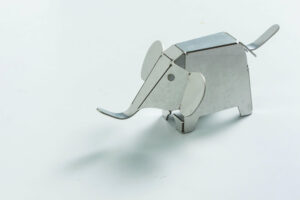
What are the characteristics of the application industries that you use metal engraving machines in machinery manufacturing? There are many benefits to using metal laser engraving machines in manufacturing. First, it is a very precise way of cutting metal. The laser beam is so precise that it can cut through even the thinnest metal without leaving any burn marks or residual heat.
Another benefit of using a metal laser engraver is that you can achieve very complex designs. The level of detail you can achieve with lasers is unmatched by any other cutting method. Therefore, if you want to add some extra sparkle to your product, a laser machine is a good way to do it. But perhaps the biggest benefit of using lasers in manufacturing is the speed at which you can work. With a laser, you can cut metal quickly and easily without any waste or extra effort.
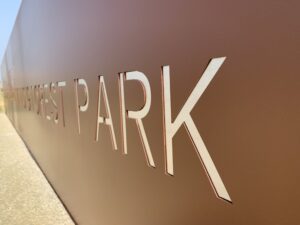
Comparison table of (features) between metal laser engraving machines and metal laser cutting machines
So, what are the benefits of stainless steel laser engraving machines to the manufacturing industry? First, lasers are so precise that they can etch even the most delicate designs into metal. It can also cut metal very easily, making it the perfect tool for precision engraving. Metal laser engravers are also very fast, which is why they are often used in mass production. And, since there is no contact with the material being engraved, there is no risk of marks or scratches on the surface. So, if you are looking for a fast, precise and non-destructive way to etch designs on metal, a metal laser engraver is the perfect tool for that.
Below is a simple comparison table listing the features of metal laser engraving machines and metal laser cutting machines. Please note that specific features may vary depending on the manufacturer and model.
| Feature | Metal Laser Engraving Machine | Metal Laser Cutting Machine |
|---|---|---|
| Function | Engraves and marks metal surfaces, creating patterns and text | Cuts metal materials with high precision to create parts and components |
| Principle | Uses a laser beam to induce chemical or physical changes on metal surfaces | Utilizes a high-energy laser to cut through metal materials |
| Precision | High precision, suitable for fine engraving and patterns | High precision, enabling intricate cutting |
| Cutting Depth | Generally shallow, focused on the metal surface | Capable of cutting thicker metal materials |
| Applications | Art, jewelry, labels, signs, stamps, etc. | Metal parts manufacturing, automotive, aerospace, and industrial applications |
| Cutting Speed | Usually faster, as it involves surface processing only | Typically slower, requiring penetration through metal thickness |
| Suitable Metals | Some models may have limitations; commonly used with metals like stainless steel, brass | Common metals like stainless steel, aluminum, steel, etc. |
| System Complexity | Relatively simple, suitable for fine engraving work | Complex, requiring a high-energy laser source and precise mechanical systems |
| Operational Difficulty | Generally easier to operate | More complex, requiring professional setup and operation |
| Cost | Lower, ideal for small-scale and light engraving tasks | Higher, due to machine and maintenance costs |
This is just a simple comparison and specific features may vary between models, manufacturers and technologies. When choosing a metal laser engraver or metal laser cutter, make the choice that works best for you based on your needs, budget, and desired features.
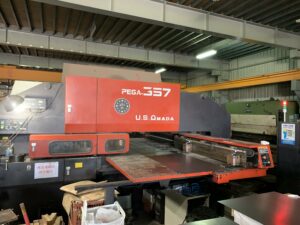
Comparison table of metal laser engraving machines and metal laser cutting machines (applications)
You may be wondering, how is metal laser engraving used in manufacturing? Well, let me tell you. There are all kinds of things that can be made with a metal laser engraver. It can be used to create logos and designs on metal products, or to add text and details. Laser engraving is also a great way to customize products. You can add a name, date or special information to make each product unique. This is the perfect way to show your customers that you care about them and their satisfaction. So, if you are looking for a way to add some extra sparkle to your products, or if you want to give your customers a unique experience, then metal laser engraving is the way to go.
Of course, the following is an application comparison table of metal laser engraving machines and metal laser cutting machines:
| Application | Metal Laser Engraving Machine | Metal Laser Cutting Machine |
|---|---|---|
| Art and Design | Creates intricate patterns, text, images, etc. | Cuts metal materials to create complex parts and components |
| Jewelry | Engraves and marks gemstones and metal jewelry | Cuts and processes various metal jewelry components |
| Signs and Labels | Produces product labels, serial numbers, barcodes, etc. | Creates metal signs, serial numbers, barcodes, and vehicle license plates |
| Metal Parts Manufacturing | Marks, engraves, or identifies metal parts | Cuts metal sheets to produce industrial and mechanical parts |
| Decorative Items | Creates metal decor items, gifts, and souvenirs | Cuts and engraves metal decor items, gifts, etc. |
| Automotive Industry | Engraves serial numbers, identifiers on vehicle parts | Manufactures metal automotive parts, frames, etc. |
| Aerospacee | Marks identification numbers, signs in aerospace components | Manufactures aircraft parts, rocket components |
| Electronics | Engraves, marks, or labels electronic products | Produces metal casings and parts for electronic devices |
| Medical Equipment | Creates labels, identifiers for medical equipment | Manufactures metal components for medical devices |
| Interior Decoration | Produces metal decor items, panels, artworks | 切割金屬板材以製作室內裝飾品、屏風等 |
This table shows the use of metal laser engraving machines and metal laser cutting machines in different application areas. Engraving machines are mainly used for finer surface treatment and decoration, while cutting machines are more suitable for cutting and processing metal materials to create a variety of different parts and components. Choosing the right model and technology depends on your specific needs and product goals.
Comparison table of (advantages) between metal laser engraving machines and metal laser cutting machines
There are many reasons why metal laser engraving machines are a popular choice in the manufacturing industry. First, they are precise and accurate, which is crucial to creating high-quality products. They are also fast and can handle large quantities of product, so they are perfect for mass production. And, because they are so reliable, businesses can rely on them to meet production deadlines and produce consistent results. Finally, metal laser engraving machines are cost-effective and can save businesses time and money in the long run. So, if you’re looking for a machine that can handle a large number of different jobs quickly and efficiently, a metal laser engraver is an option worth considering.
| Advantage | Metal Laser Engraving Machine | Metal Laser Cutting Machine |
|---|---|---|
| Precision | High precision, enabling detailed engraving and marking | High precision, allowing for intricate metal cutting |
| Engraving Effect | Capable of creating complex details, patterns, and text | Smooth cutting finish, capable of handling complex shapes |
| Surface Treatment | Provides marking and decorative finishes on metal surfaces | Produces smooth, clean edges for parts |
| Versatility | Applicable in various fields such as art, jewelry, decor, and signage | Suitable for cutting and processing metal parts |
| Design Flexibility | Supports diverse designs and patterns, allowing for customized engraving | Enables the production of complex parts and components |
| Marking Speed | Relatively fast, suitable for batch production and manufacturing needs | High cutting speed, ideal for efficient metal fabrication |
| Material Selection | Suitable for engraving and marking on various metal materials | Can cut a wide range of metals, such as stainless steel and aluminum |
| Minimal Heat-Affected Zone | Minimal impact on surrounding areas, suitable for fine tasks | Minimal heat-affected zone during cutting, reducing warping and discoloration |
| Creative Expression | Enables creative art and design work | Capable of creating complex structures and shapes |
| Non-Contact | No physical contact with the workpiece, preventing damage | Non-contact cutting, minimizing material loss |
This table lists the respective advantages of metal laser engraving machines and metal laser cutting machines. Engraving machines mainly emphasize precision and surface treatment, while cutting machines focus more on efficient metal cutting and processing. Depending on your needs and goals, you can choose the right technology to achieve the best manufacturing and decoration results.
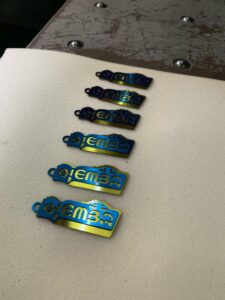
Comparison table of (disadvantages) between metal laser engraving machines and metal laser cutting machines
You mentioned that metal laser engraving OEM has many advantages over other methods. What are the advantages? Well, first of all, it’s very precise. Lasers can cut through the thinnest sheets of metal with ease. It’s also a very quick process, so you can get large batches done quickly. But there are some disadvantages. First of all, the laser can be a bit tricky to use and it takes a while of practice to get the hang of it. Secondly, setting up a metal laser engraving machine can be quite expensive. However, despite these disadvantages, the advantages definitely outweigh the disadvantages, which is why metal laser engraving is becoming more and more popular in the manufacturing industry.
Of course, the following is a comparison table of the disadvantages of metal laser engraving machines and metal laser cutting machines:
| Disadvantage | Metal Laser Engraving Machine | Metal Laser Cutting Machine |
|---|---|---|
| Material Thickness Limitation | Generally only suitable for thinner metals, unable to handle thicker materials | Limited to metal cutting and cannot perform other types of processing |
| Cutting Speed | Relatively slow, as it mainly involves surface treatment and engraving | Requires longer time for precise metal cutting |
| High Cost | High price, especially for high-precision models | Higher price due to equipment complexity |
| Cutting Precision | Lower cutting precision, not suitable for precision cutting | Though highly precise, may require post-processing for final dimensions |
| Uneven Thickness | Difficult to achieve uniform engraving, especially on uneven surfaces | Difficult to achieve completely uniform cutting thickness |
| Complex Operation | Operation and setup may require professional knowledge and skills | More complex operation, requiring support from skilled operators |
| Limited Working Area | Usually only able to handle smaller-sized workpieces | Limited by machine’s workspace and movement range of the cutting head |
| High Maintenance Cost | High maintenance and upkeep costs due to technological complexity | Maintenance costs may be high, requiring regular upkeep and part replacement |
| Additional Processing Needed | May require additional surface treatment and cleaning after engraving | May require surface treatment after cutting to remove burrs and oxidation |
| Steep Learning Curve | Takes time to become proficient and achieve desired results | Time needed to learn how to operate and adjust the machine |
This table lists the respective disadvantages of metal laser engraving machines and metal laser cutting machines. When choosing the right technology and equipment, in addition to focusing on the advantages, also consider the disadvantages to ensure your needs are best met.
Summarize
At this point, you have some understanding of the metal laser engraving process. But, what are some ways it can be used in manufacturing?
Below are some of the most common applications.
1.Identification – Metal tags can be engraved with the company’s name or logo, making them easy to identify.
2.Traceability – Serial numbers or other tracking information can be engraved on metal parts to make them easy to trace.
3.Marking – Metal parts can be engraved with special markings to indicate that they meet certain safety or quality standards.
4.Design Changes – Sometimes small changes need to be made to metal parts, and laser engraving is a quick and easy way to do it.
5.Decorative details – Engraved details can add a touch of elegance to metal parts.
In recent years, the use of metal laser engraving machines has greatly increased in the manufacturing industry. This is because they offer many advantages and benefits that other machining processes do not offer. Some of the advantages offered by metal laser engravers include faster production times, greater accuracy, and the ability to handle a variety of materials. In addition, they produce less waste and are more environmentally friendly than other processing processes.
We are Chiayi metal laser cutting processing factory. Baixiang takes the continuous pursuit of technological improvement and product innovation as its primary goal, and introduces automated processes to provide customers with the best services with the latest technology. It also introduces ISO 9001 & ISO14001 international quality and environmental protection system certification to become the most reliable process for customers with the best quality assurance. partner

